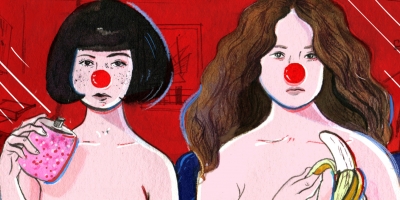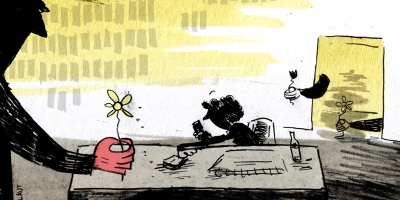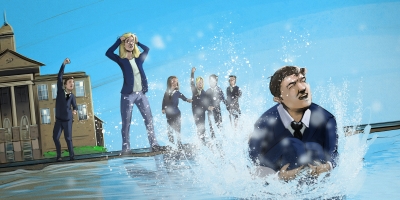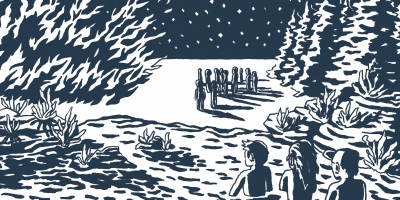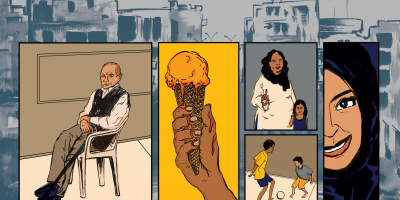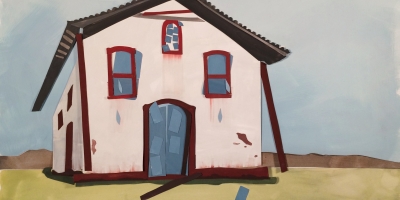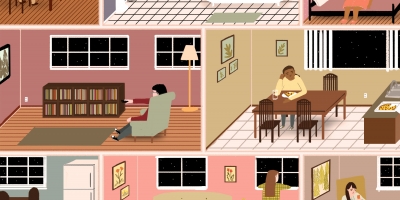Fiction
Let All the Restless Creatures Go
by Sara Lippmann
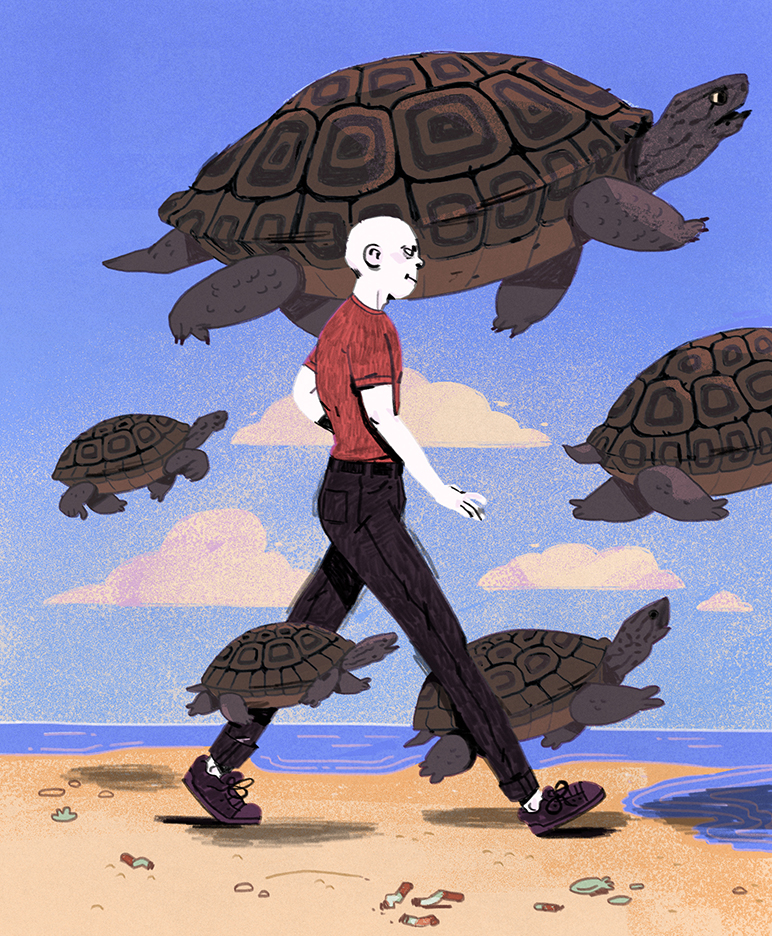
In June, I enrolled in Ocean County Community College. It cost practically nothing if you lived in-state. I could have done an entire degree online, never dipping into my cash flow or leaving the comfort of my room, but I was tired of being shut in, like some monster in a cave. I was tired of our sad house and its smell of forgotten bathwater. I was nineteen. What was life, anyway? When I told my father I was leaving, he winced as if the shock were physical, then recovered with a blessing and a brisk hug, chins over shoulders, careful not to touch too much, pat pat pat, lest we catch each other’s shortcomings.
My father’s sister Lena and her husband Mark had bought a place in Waretown ten minutes from campus, so in exchange for laying their laminate flooring, they let me crash. They’d just installed a shower in their basement, a toilet next to the boiler, so I had to piss standing sideways in order not to burn. I slept on a futon and brushed my teeth in the laundry sink, but Mark fully stocked the minifridge and Lena radiated eagerness like an electric heat, like she was auditioning for the role of her life, running off to Kohl’s with fresh purpose, returning with mouthwash or socks and flashy-print boxes of tissues, even though I hadn’t asked for anything.
I registered for Korean I, Business Management, and Wetlands Ecology. I had a second-degree black belt in tae kwon do and a fledgling handyman business, but the third course, billed as a cross between environmental science (of which I knew little) and marine biology (of which I knew even less) was the one that had me stoked. Suddenly, it seemed possible to learn beyond the rote memorization I had to complete for my GED. Lena said I might as well take advantage of the coastal offerings. She said this as if by coastal she meant worldly, and she was right; if I wasn’t willing to expose myself to new experiences, I might as go back to the arcades of Bergen County.
The first day, I was nervous. I wasn’t used to school or students, much less people, other than the occasional customer whom I asked to sign on the line for services rendered, closets rehinged or leaky pipes turned. Lena bought me a new backpack, brushed suede on the bottom, which I filled up with blank notebooks so it wouldn’t hang off me loose. We stood in the kitchen waiting on a pot of coffee. She’d just come off her shift—she was a physician’s assistant in the ER at Barnabas Hospital—and her faded green scrubs were splashed in iodine. There was a depression in her forehead from the elastic of her surgical cap. The smell of latex rose off of her. She stuffed a banana into a snack bag, wrote my name in bubble letters, brown paper creased along the edge.
“In case you get hungry, Nick.”
Lena smiled the smile I imagined she offered patients when they came in with chronic, indeterminate pain. She held out the bag, a smiley face drawn on it. I couldn’t remember the last time I had a banana that wasn’t in deli-chip form.
“To fresh fruits,” she said. “New beginnings.” We clinked mugs. My aunt wore her wedding ring like a charm around her neck, the flushed skin above her breasts dotted with freckles. I wasn’t looking on purpose. I just wasn’t big on eye contact, and there they were: spilling over with kindness. They looked like a burden.
Lena ducked underneath the brim of my hat and beamed up at me. “Go get ’em,” she said. Then she rustled my head. It was an innocent gesture, but my hand flew up, and she retracted hers as if stung. The hat stayed secure over my bare, naked scalp.
On my eleventh birthday, I started losing my hair. It began slowly, a change purse of spots, symmetrical rounds the size of dimes, nickels, silver dollars. A fist of hair in the shower, a clutch in a comb, odd patches of down on my pillow like some kind of spritely present, the color once blond, now sandy, indistinct, shit brown. The cut—to the ears, side part—standard issue, a stock helmet until the strands started to die. You know in cartoons when the mouse catches such a fright he runs—literally dashes—out of himself? That’s how it looked: like the fur casing of a chased, traumatized mouse. Only it was me. I was shedding. My mom had been gone two years; she traveled with the New York Philharmonic, so it’s not like she was dead, only busy. She had a studio apartment in Lincoln Center, and at first I visited her, Carvel cakes and ice-skating on Christmas, but as the principal cellist she was in constant demand. There was always some place to be. My father never protested. This is not who we were. Mothers, newts, lightning bugs, we were not trappers, we did not hold anything against its will, but rather opened our hands to the night sky, wiggled fingers, let all the restless creatures go.
“What have you done to yourself?” My father looked up at breakfast.
“Nothing.” I lowered my spoon into my cereal bowl, the yeasty milk a paste in my mouth. My stomach lurched.
He slammed his palms. “You think she’ll come back to a freak?”
Later, he’d take it back. My father never meant harm. It was an honest mistake. The patches looked deliberate, as if I’d used razors and scissors to transform my head into a chessboard, as if I was asking for it, begging for attention, exposing myself to ridicule, trying to be noticed in some way. I assured him this was the last thing I wanted. He suggested dark colors. He said, Sit in the back row. Keep your head down. Do your work. Blend. We didn’t say more after that.
Silence stanched the damage until Vinnie Frankel tripped me down the stairs, giving me a fat lip and a bloody nose. The school counselor suggested I see a doctor. In the nurse’s office, I sucked a Dixie cup of ice. A few weeks later, the specialist did a full work-up: blood, piss. My glands were neither hypo nor hyper. The bad news and the good: I was a normal kid. She gave me some topical creams and pastes and shrugged. There were no real drugs to prescribe, nothing that could reverse the pattern. Premature hair loss fell into the lumpy, amorphous category of autoimmune disorders. It’s not like I could plant some seeds and water myself, add direct sunlight and expect to bloom. “There is little you can do,” the doctor said, scribbling on a pad. She tore off a page, flapped it. “Try to eliminate stressors in your life.” I wasn’t stressed. I played video games. School was school. My dad worked, he came home. We ate. Washed the dishes, dried them. My mother called from Vienna, from Budapest. The phone rang and rang, but we no longer leapt to answer.
To contain the problem, I developed a system. I set my alarm on the hour in order to rotate my position throughout the night, thereby preventing myself from lying too hard in any one spot for too long. I wore shower caps and shampooed only once a week. There were periods of stability, no major loss or growth, what the doctor called “unremarkable change.” Around my first wet dream, things unintentionally got worse. It’s not like I was beating off. I resented my body’s rebellion and could not bear to touch myself. Apparently, my follicles couldn’t stand me, either. They kept shriveling up and dying, exposing raw areas of scalp that had never been exposed to light. My bed looked like it had been tarred and feathered. I tried to clean up, combing over the few measly strands on my scalp, but I eventually abandoned that strategy. I stopped looking in the mirror. There was no point. Plenty of people were doing the looking for me.
I wasn’t stupid. I knew the skin around my eyes had turned sallow from exhaustion, my pupils from water to ice, my head whiter than white. I wore headphones to block things out, but kids can be mean. The counselor suggested martial arts. My father was all for it. “Life pulls no punches,” he said, shoulders deflated. I understood this was his way of protecting me. It sure beat coming home alone. The dojo was in a nearby shopping center, so after school I trained like hell, mastering my three-sixty roundhouse kicks in the wall of mirrors and splicing inch-thick boards with the planes of my hands and feet, climbing the ranks swiftly from green to brown to red.
I was not weak, despite all the crap I couldn’t control. For a while, Sensei Will took me under his wing. I stayed late to clean the mats and sparring gear, he’d buy me a soda and a slice next door. Will was maybe twenty-five and really into anime, those big eyes and big tits. One Saturday after class, he took me to a convention in the lobby of a Marriott, where people dressed like Halloween and walked around signing autographs as if they really were the heroes they claimed to be. “Cosplay,” Will called it, handing me a mask. I was dazed, as he coughed up thirty dollars for a selfie with a beaming throng of girls in roller skates and metallic crop tops. They were all the same character. I didn’t get it.
“What is there to get?” Will snapped. “Fantasy is fantasy.”
That was the end of tae kwon do. By that point, other students my age had outgrown their gawkiness, becoming more interested in football and parties than kamas and nunchaku, leaving a clumsy crop of the pint-sized. I towered over them. My black belt was as much a reward as it was a dismissal. Will was shorter than I was and had to rise onto his toes to squeeze my shoulder. “Dude,” he said. “Do yourself a favor. Don’t try to be a hero. Wear a goddamn hat.”
Wetlands Ecology met on the third floor of the Marine Life building, a cement-poured structure the color of wet sand. The room was large and overly air-conditioned, little swingy desks in a circle, the students, a mix of young and old, tapping on their phones. I sat by the window and waited. Outside, people walked on the path, their backpacks bobbing behind them like buoys.
“Are we in the right place?” Professor Jay announced, arriving in a fluster of papers and books and reusable canvas bags. She wore nylon cargos and a plaid button-down tucked into a nautical weave belt. Plopped everything down on the desk. She could have been fifty or seventy. When she turned, her long silver braid swished like a satisfied tail. She wrote her name and number on the board.
“If you ever need anything, this is where you’ll find me.”
No one wrote it down.
From there, she laid out course procedure. No tests, no grades. This would be the only time we’d meet in the classroom. Jay braced her arms on the podium, leaned in conspiratorially. Diamondback terrapins were decreasing by the dozen. In some states, they were already endangered. Our mission was to save what remained. From her pile she produced a laminated fact sheet with a photo of the native New Jersey turtle, neck stretched pencil-dick thin, beady head barely an inch thicker, its shell a patchwork of yellow and green. She flapped a calendar. Another graphic. We were in the middle of mating season.
“It’s now or never,” she said. From here on, we were to think like scientists. We were to act like human beings. We would employ our five senses to gauge changes in habitat, expertly transferring the fragile eggs from the windy high dunes to designated protected areas. We would record and log accurate data. Most importantly, we would conduct all fieldwork from the terrapin hatchery down in Barnegat Bay. As she said this, she passed around a sign-up sheet drawn haphazardly in magic marker. One column if you had a car, one column if you needed a ride. We’d be matched together accordingly.
“Objections?”
“Or forever hold your peace,” drawled a girl from the back of the room. Her springy hair fell past her shoulders, one side shaved by the ear and sprayed. She wore a purple tank, wide upper arms meant for decking and lugging weight. She knifed two fingers in the air.
“Well, then.” Professor Jay clasped her hands. “This is it.”
No one could answer why it was happening, why it happened to me. If there was a genetic link to hair loss, it skipped every other generation in my family. By thirteen, I was a ping-pong ball. I was Casper the Friendly Ghost. My father drove me back to the doctor, who clicked her pen repeatedly before slipping it into her pocket. “Alopecia totalis,” she said with a self-satisfied uptick. My condition sounded like a drug for erectile dysfunction, a senior couple heading skyward in a hot-air balloon. She left the room. A nurse returned with a stack of brochures. “Options,” she said. She lowered her voice and said she knew a guy who made beautiful wigs. Just say the word. She’d get me a price on a fur. I dangled my legs off the edge of the examining table. My feet had jumped three sizes. They looked like swollen fish. She mentioned support groups for kids like me. I thumbed a pamphlet of the annual Alopeciapallooza: pictures of a sweaty, throbbing mob of bald teens.
My father’s fingers buttoned and unbuttoned his coat, his fingers twisted the wedding ring lodged on his knuckle, his fingers ran through his hair, which was wavy, gray. Bushy at the sides, appropriately thin on top. In the examining room, he paced, circling a drain. I was his only child. He sniffed. “Thank you. We’ll consult with his mother about a plan and get back to you,” he said. Only we never told her. There was no plan. No more doctors.
Next class, we lined up outside the building like a funeral procession. Because I had a pickup, I had room in the cab for one passenger. The girl in purple: Shasta Rain. For real. I wanted to tell her she sounded like a soft drink, like body wash or shampoo, but I couldn’t remember the last time I was this close to another person. My stomach rumbled; that morning, neither Lena nor Mark showed up for breakfast, so I left without eating. I hoped Shasta couldn’t hear my hunger. She smelled like bathroom spray, floral concentrate. I asked her to fasten her seatbelt. She asked if she could change the radio station.
“Whatever you want,” I said.
Before we pulled out, Professor Jay tapped on my window. I rolled down the glass and she nosed around the cab like a periscope, eyes red from sun or tears. Shasta jangled her bracelets beside me. I wasn’t sure where to look.
“Give me a hand with supplies?” Professor Jay said. I hopped out. Shasta stayed put. In silent sync, Professor Jay and I loaded up the flatbed with buckets, chicken wire, test tubes, pliers and pincers, lumber.
“Environmental science major?”
“Undecided.” I’d been in school for all of five minutes.
“You don’t have to know. Certainty is my department. I can sniff out those who have what it takes: passion. Steely resolve! Perseverance in the face of futility!”
I slammed the trunk.
“Don’t be ashamed,” Professor Jay said. “It’s a rare and beautiful breed. Most people wish they had an ounce of what you have.”
In the cab Shasta fiddled with the dial. She had terrible taste, which wasn’t entirely her fault. We were in the no-man’s land between stations, New York bands cutting out and nothing but crackle and fuzz buzzing north from Philly. I rolled down the window while she checked her phone for traffic. It was sunny and hot, coming on a holiday weekend, and the Garden State was already backed up in an oily haze. She stuck her phone in my face: a long artery of red.
“It is what it is,” I said.
“Screw that,” she said. She knew a better way, along Route 9 and the back roads, past abandoned farm stands and deep through the Pine Barrens.
“We’re not supposed to separate from the group.”
“And sit stuck for miles?” She offered me a piece of gum. “Trust me.” I studied the road. Shasta dropped the wilted stick of cinnamon into my lap.
I chewed, sugar seeping. My teeth squeaked. Shasta directed: turn here, here, here. We made great time. When we approached the Causeway, she cranked her window, the truck rattling in the wind. She unclipped her hair, thick curls, frosted in strawberry and gold, and let them whip. She whooped like a wild thing. Her face reddened. She thundered her feet on my floor mats.
“Your turn,” she said. “Go on, Saint Nick. Let’s hear it. Get loose.”
I gripped the wheel.
“I’m cool,” I swallowed.
“And I’m an endangered turtle,” she half-snorted, stretching her legs on the dash. A shakily drawn vine twitched around her ankle. Birds cawed. Salt filled the air. The truck swayed like a drunk as I floored it over the asphalt to the other side.
We were the first to arrive in Barnegat Bay. Before I cut the ignition, Shasta climbed onto the hood, inched right up to the windshield, and eased against it like a lawn chair. Her shirt rode up, exposed a trellis of skulls stretched like Silly Putty along her lower back, the elastic lip of her underwear poking above her hip. I slammed the door. She smacked the paint beside her. It was about ten degrees cooler than on the mainland, the air socked in mist. I shoved my hands into pockets.
“Sit,” she said. I joined her on the hood. Our thighs touched. Our smells swirled, cinnamon, like we’d known each other forever. Like it was no big thing for her to look me in the eye and call me “Baldy.” To flop her mess of hair on my shoulder and say, “Tell me everything.”
By high school, I’d gone from totalis to universalis, thanks to the kamikaze nature of my eyelashes and eyebrows, the fuzz on my forearms diving off pier like depressed caterpillars. Once I had no hair, none anywhere on my body whatsoever, I could relax. I had already lost. Nothing to do but adjust to my new state. I was an exposed nerve of sweat, aerodynamic as a jet plane. I was a plucked chicken. A walking punchline. I was a load of laughs, if I wasn’t the unfortunate brunt of the joke. In the gym locker room, guys combed their armpits, measured their dark upper lips. I took Will’s advice and covered up: ball caps, truckers, tweedy newsboys. During the Pledge of Allegiance, a kid knocked my hat. The room gasped. Rumors spread that I was sick, I was sickly, I lived in Ronald McDonald House. I did not correct them. They left me alone. Within a year, they forgot about me. For two and a half years, I walked the halls, invisible, then walked out entirely, leaving my graduation gown to rot in my locker.
“Greetings, conservationists,” Professor Jay said, pulling up. We flocked toward her. She climbed out of her car, a cream-colored VW bug, original model, rust along the fender, collaged in bumper stickers: FRACK OFF. SAVE THE BAY. EARTH FIRST. She shielded her eyes to the sun. “Is this all of us?” We numbered around twenty; a handful had vanished after the first meeting. Shasta said that was typical. People came and went. This was her fourth term of classes at OCCC, but she still was years away from a degree.
“Who remembers why we are here?” Jay said. But it was rhetorical. We were to draw samples of everything. With the salt marsh to her back, she charged into the wetlands and introduced us to the complex ecosystem, fertile home to many species of osprey, gull, and egret. As she spoke, she removed the binoculars on a beaded string from her neck and circulated them. If we hoped to have any positive impact, we’d have to be tireless. Track the water’s pH, the toxicity in the swamp stream from the fumes at Oyster Creek, the nuclear plant whose concrete cylinders loomed in the distance, and which drew its cooling water from the estuary around which we stood. Recently, Jay reported, hairline leaks had been detected in the pipes, but they were deemed too insignificant “to warrant a public-health crisis.”
Jay pushed up her sleeves, threw out her hand like a car girl. “Behold the safest nuclear plant in the country, if you don’t choke on that oxymoron. Still, tritium bleeds. Still, no accountability. Still, more political bullshit. How much more radiation can we take?” Her fist shook. I felt the class shift dopey-eyed in my direction, the collective heat of their gaze reminding me, lest I forget, that I looked like a chemo patient.
My face steamed.
“Don’t piss away your power,” Jay said. She gave an extra nod to me. “You are the future. You owe it to yourselves.”
“I thought we owed it to our shellback friends,” Shasta said.
That night, I went upstairs for dinner. I’d had enough of a hamburger bag. I felt alive. I wanted to try to shape it, to tell Lena and Mark about class and Professor Jay, about Shasta Rain on the bridge waving free, not caring what anyone thought or how she looked, which was beautiful. I wanted to say, “I’m excited to be a part of something, something bigger than me,” and for Lena to pull me tight and say, “You’ve got this”—even if I wasn’t one hundred percent sure what it was. On my way home, I’d pulled over at the ShopRite for mud pie ingredients: graham-cracker crust and instant chocolate pudding, ready set without baking. This is what my father made for special occasions. I shook a festive can of whipped cream, but Mark and Lena weren’t feeling up for dessert. Lena picked at her lasagna noodles. They looked like entrails. Her eyes were bloodshot. She didn’t say a word. No one asked about my day. Mark stood in front of the sink. The faucet ran. He picked up a sponge, wrung it.
“It’s not selfish.” Mark spoke tightly, like he was trying to balance a toothpick in his jaw. “Just because other people do something is not a reason to blindly follow.” I tilted the canister, shot a cloud into my mouth. He said, “Nick, if everyone you knew jumped off a bridge, would you?”
I wiped my lip, said I didn’t know many people.
Mark said, “Bingo. Lena, I rest my case.”
For twelve weeks, on Tuesdays and Thursdays, we drove. Most of the time Shasta talked, it didn’t matter what I said. She kept on, never deterred by silence, by my absence of encouraging ahs and uh-hums. She’d start with her morning alarm at 8:05 and take it from there, filling the air with her comings and goings, with her astrology reports, her rising sign, her sun and moon signs, speaking at the same clip regardless of whether she was detailing her struggles with English comp or her cat’s diet or her brother’s moody-ass girlfriend, a nasty drunk Shasta had to throw out of the bar where she worked because that was the thing about people, she said, everyone’s in it for themselves. It was a lot to take in, I couldn’t follow it all. To tell the truth, I wasn’t always interested, but sometimes I was. Sometimes we even went back and forth a bit in actual conversation, her seat tilting back, her skirts, nubby terrycloth, either white or blue, shrinking up her thighs. Sometimes she’d tap my arm, her nails filed to points, shooting sparks up my spine. On the Causeway, we raged tongues and screamed our hearts raw. She had this way of looking at me without looking at all, as if I weren’t some pale, hairless mutant. As if I were just a guy. I could almost believe her.
The field site was serious business. We were there to work. A few people goofed off, kicked the dunes, which were not fluffy but hard. Professor Jay snatched a kid’s pack of cigarettes and told him to come back once he decided to stop trying to kill himself. The rest of us hunkered down along the craggy shore. We got muddy. We waded calf-deep, minnows scattering, a stinging cold, and filled-up test tubes. You, you, you, Professor Jay said, assigning tasks that united us in purpose. One group took up shovels and metal poles and carried them like crosses through the salt grass, affixing road signs along the curb: yellow diamonds that said Turtle Crossing. As if raccoons and coyotes could read. Black stenciled prints of a mama and offspring accompanied by the words Caution. Be Terrapin Aware! The sign trussed with reflectors blinking on and off like a siren. A second group hiked the bank with plywood and nails to rebuild the battered nesting station, damaged by winter. They dragged sheets of wire to reinforce the rescue. I wasn’t sure how the eggs were going to get inside. Group 3 answered that question. They tiptoed around, sometimes crawling on hands and knees in gloves bright as toothpaste. It was their job to relocate the clutches of eggs to safety without crushing them first.
Shasta was in this group. As she combed the edges of the bay, I held my breath. I remembered the time my mother led me through the orchestra pit during a practice break, hands on my belly lest I collide with a music stand and cause a cacophonous domino effect. Still, I managed to walk into a woodwind. Shasta cupped her hands and brought eggs to me like jewels. I counted their brown spots, tagged them, and tucked each into its own incubating compartment. I named them: Eenie, Meenie, Miney, Moe. I named them Larry, Curly. Harpo.
“How’s the future look?” Professor Jay came over in waders and a ranger’s hat. She took my hand. I thought she wanted an egg, but instead she examined my palm line, tracing each crease with a finger. I surrendered to her touch. She smelled like eucalyptus. At first it was kind of nice, to be touched at all, but then, you know—weird. The egg train was piling up. Shasta was waiting, others behind her. I slipped my hand from her grip.
“Promising,” she said, and moved onto the next group.
When I got home, Lena was at the kitchen table, elbows on the wood, head in her hands, a box of red wine dripping at the spigot. I backed out slowly, but the door creaked. “I don’t bite,” she said. So I stayed, and Lena poured and pushed her glass toward me. Her lipstick left a fossil print on the rim. I asked if she was okay.
She laughed a strained laugh. “Why? Don’t I seem happy?”
I said I wasn’t sure what happy looked like.
She nudged a chair. “Then cheer me up.”
So I told Lena about school, class. We’d salvaged eleven new eggs from being dug up and eaten by predators, increasing their chance of immediate survival to eight-five percent. We’d measured growth circumference with pincers and nestled them into the designated pockets we’d carved so we could monitor them in anticipation of next month’s hatching. In a way it felt wrong, I said, to disturb the natural habitat with human intervention, put our bossy hands on everything, but Professor Jay said we’d already done enough injury, diminishing the species by a quarter, and the least we could do with our short time on the planet was fix past mistakes, give the terrapins every last chance we could—just as we would give our own children.
Lena cupped her glass tightly.
I said I bet it was the same as her profession, the saving part.
“No one’s a knight,” she said, drinking. She drank. “Save maybe your father. My brother’s a bona fide saint.” I didn’t see it. All I could picture was his car in the driveway, the wood-paneled living room, stifling curtains. Home was a coffin but for music, The Umbrellas of Cherbourg cheerfully tinkling on repeat, as if the upbeats could breathe life into all that’d expired. My father listened in the dark. No one could compete with that kind of loneliness.
“He might not say it, but he really loves you.”
“I love it here,” I said, panicky she’d send me back. “You and Mark rule. You’re like parents, but cool. I finally feel like part of a family.”
At the word family, a sob escaped her. I think it surprised us both. I squeezed her shoulder like my sensei had done with me. She placed her hand over mine.
“Well, if you were my child, I’d be missing you like crazy. Last thing I’d want would be to lose you.”
I felt like a jerk, but Shasta wanted to go to the beach after class. It was August and she was dying, dying of heat, she said, and I would be cruel to deny her simple wish. The island was so narrow, less than half a mile wide, that it was really a no-brainer. We were close enough to hear the Good Humor bells and smell the broken barnacles. She could practically see it all, lifeguards and boogie boards, a few lousy blocks away. Everyone deserves a reward. She slapped my arm and I flexed. I’d been working out in the basement with Mark’s free weights. Still, no way was I shedding my clothes. There was not enough lotion in the world to protect me. Shasta, on the other hand, already had her top off. She’d come ready in a bathing suit, the jet black triangles leaving moons of flesh, her skin spilling as she wriggled out of her shorts. She was disrobing right there in the cab, a ring through her bellybutton, tattoos everywhere, the royal blue bead of the evil eye, for Christ’s sake. I said I was needed at home, which was a lie; Lena was on overnight, and Mark had gone down to Atlantic City. I’d caught him sleeping on the couch in the morning, but it wasn’t my business. I didn’t ask. What I really needed to do was call my father, but Shasta produced a bottle of something that smelled coconut sweet. She lifted the hair off her neck revealing an inky ankh. I wanted to know if it hurt.
“Tattoos,” I said. “What do they feel like?”
“I don’t know. Numb after a while. Your body gets used to the pain, your mind gets to wander. Like a field trip.”
I slathered her back and shoulders with sunscreen, careful to web my hands so as not to leave thumbprints. Her skin was a gash of red spots, bumpy but warm. I rubbed the cream, my hands melting into her until she pulled away, popped the car door, and dropped her sandals on the dunes. I followed. Like a child, she ran for the surf, crushing through shells and cigarette butts and dried clumps of seaweed. I watched her grow smaller and smaller. The tide was coming in. She did not look back but sped up to meet the waves, palms pointed, and cut through the crest before it broke over her.
My father had news. “Your mother is getting married,” he said when I finally reached him. To a conductor in Berlin. Or maybe she’d already married. He wasn’t sure. Poor connection when they spoke, or maybe he stopped listening out of self-preservation, but he’d manage to glean a whole band of stepsiblings, a grand flat with a terrace along the Spree. He puffed, as if short on breath. “I’ve been meaning to call you,” he said, which summed up both of us: meaning to, not doing. “Hold on, I have her email.” I heard the click of a mouse. “She mentioned a EuroRail pass. Your belated graduation gift.”
We never told her I’d dropped out.
“Listen, Dad.”
“This could be a real opportunity, Nick. Show her the man you’ve become, who she’s been missing out on all these years.” It was excruciating, the enthusiasm in his voice as he said it. “Whaddya think?”
I thought maybe Shasta would go with me. This was ridiculous thinking, but that next day in the car, I don’t know what came over me. She was raging about her roommate who couldn’t make rent but could stockpile cases of vape juices, when I broke in and asked what she knew of Europe.
“For real?” She wanted the hell out of Dodge, she told me. So much so that she bounced right out of her seat and pressed herself against me, my buckle digging into her leg clear over the Causeway. I pulled over. I couldn’t believe it was happening. This was real. She climbed onto my lap and practically tackled me, pawing and panting like a cooped-up dog. Her hair tickled my throat, my neck, chest. I thought I’d explode. Then she took off my hat and placed it on her head, brim backward. She palmed my scalp, round and smooth as an egg, in her hands, and kissed it.
Fog clouded the bay. Professor Jay barely glanced up. She studied her numbers. Everything had changed in the last few days. The new reports were disappointing. Count was down. Her disheveled braid swept her files as she shook her head. Her jaw clicked. A mother terrapin had been run over in the harbor alongside its hatchling. A half-dozen eggs previously accounted for were now missing.
“What went wrong?” I asked.
“You tell me.” If there was an edge in Jay’s voice, it was understandable. It could be any number of things: animals, accidents, theft, human error. Jay tapped her pencil, her anger a brick. And yet there was resignation in her voice as she spoke, her posture curved more than usual. The semester was almost over. There was little to do other than straighten up, make peace with the fact that we tried.
“And what—accept defeat?”
She looked at me. “Not defeat. Nature, Nick.”
Later, during the ride home, Shasta said, “Some people, you know? I don’t know if it’s karma or a curse. They’re like magnets for the short stick.” She produced a sample of moisturizer from her bag, massaged it over her hands, the cream pinkish like the inside of a shell. I asked what people, and she clucked as if I were dumb for missing something so obvious. Jay. Didn’t I know? Her spouse had early-onset dementia. “The guy can hide his own Easter eggs.”
Shasta talked like this all was common knowledge. His deterioration was the direct result of some environmental exposure he’d suffered as a child, which the state was unwilling to acknowledge. Jay’s days consisted of caring for doomed reptiles and nursing a grown man who’d forgotten how to wipe himself. Shasta checked her teeth in the mirror and sucked.
“Can you imagine a lonelier life?”
I wondered aloud how she knew all this.
She reached for her lip gloss. “Pay attention, Nick. I know more than you think.”
In late August, the terrapins began to hatch. Speckled shells scattered the bay like abandoned jigsaw pieces, blending with rocks and crab legs. On our last class, we counted the number of hatchlings in the station. All things considered, we did okay. For every baby that made it, there were three dead. Time was critical. Professor Jay hauled a large glass tank onto the sand, something fit for python, tossed us a couple red buckets. We filled it with marsh water, then ran up the dunes to the hatchery. Gently, we lifted the turtles—their cool tiny bodies cradled in our palms like talismans, charms from a gumball machine—to complete the transfer and safeguard the young from boating and cyclist hazards, from other unknown elements. That was it. Jay would bring the tank to the on-campus lab for further monitoring. But our job was done.
So was Shasta. I will never understand it. One day she was strolling across campus in her ripped jeans, one minute eating a sub on the steps, extra salt and sweet peppers, and then she was gone. I texted but never heard back, I called but always got that double ring, no machine, the signal that her line was occupied. I even joined Facebook for the sole reason of looking her up, but when I typed in her name, there was only a picture of a cat in sunglasses, the rest of her account protected, private, gone. I wasn’t about to chase her. I knew better. I emailed my mother a selfie. She emailed me an invite to the opening-night gala in Berlin.
She wrote, “Leave the latex skullcap at home. We are adults here.”
Lena and Mark said I could stay with them as long as I wished. I repaired the dishwasher. I painted their office sea green. An adaptable color, if not quite the gloss they’d wanted. Lena worked more. To accumulate time, just in case she got pregnant again and it took. My father came down on Sundays. It was awkward, then nice. I anticipated his company. We’d never really known each other. Afterward, Mark and I sat on the porch with beers. The weather already had turned crisp, the sky lit with familiar patterns. Minutes went by without cars.
Mark said, “Isn’t the world full enough?”
That October, I ran into Professor Jay on campus. She was frazzled as usual, cloth sacks on each arm like a scale. I was talking to this new girl in my statistics class when she tugged my sleeve.
“Nick!” she said, breathless. I was just the person. “Can I borrow you?”
I excused myself. Jay asked if I still had the truck. I pulled it around to her lab and waited until the metal door creaked. With a flash of schoolgirl urgency, she waved me in, and I pictured her and my father sitting side by side at the Thanksgiving table, all of us squeezed in at Mark and Lena’s, a loaf of cornbread. There was no science for bringing people together. Still, it was worth a try. I followed her inside the building, down the corridor to the Marine Life lab where Jay stored the tanks. There must have been fifty young terrapins in salt water. Jay switched on a clamp light. “Seventy-three, to be exact,” she said. Carefully, we carried them out to my flatbed. Jay checked the pH, balanced the brine. Then we tied down the cages and pulled the tarp up and around like we were tucking them in for the night.
“Will they be okay?” I said.
“It’s only a short distance.”
When we approached the Causeway, I rolled down my windows and blasted the radio. I pounded my boots and floored it, as if I’d forgotten who I was. Jay looked over, brow raised, a glimmer in her eyes.
“Habit,” I said.
Wind rushed in. My hat blew off. I let it lie.
A fresh crop of students was waiting for her. I didn’t know them, but they seemed as committed as we’d been, ready to pick up where we’d left off last semester. One even looked a bit like Shasta, with the hair and sunglasses, but it wasn’t her, of course. A pair of guys in sweatpants jogged over. They slid a tank off the truck; Jay and I took the other. “Watch it!” she cried, water sloshing against the sides. The class swarmed for a better look. Jay lifted up a terrapin, its shell a glossy white from the coating she’d applied, its tiny limbs pedaling in the air, as if desperate for some kind of grounding. I watched her place them into her students’ outstretched hands. After a few minutes, she motioned for me.
“You first,” Jay said. We submerged our arms to our elbows. One by one, I handed off the turtles to Jay, who lovingly passed them to the students, who carried them to the water’s edge. It was a silent, somber march. Everyone knew the odds. Although the new generation had made it this far, from the hatchery to the lab and home again, to their successful release in the current, they’d still face long-term threat along the coastline. It was important to have realistic expectations. Even in ideal conditions, there is no guarantee.
